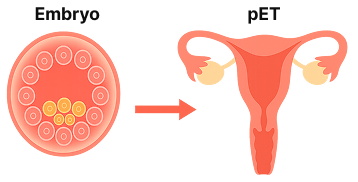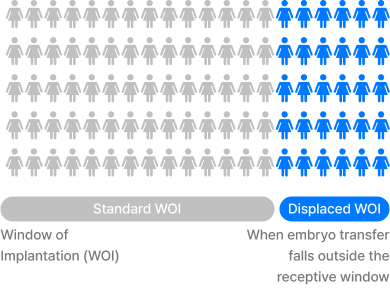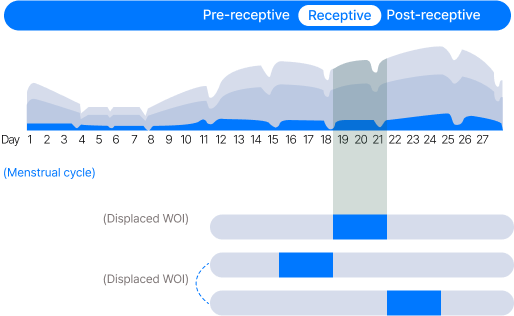SERVICE

Discover the world’s first blood-based test that identifies your personalized optimal embryo transfer window.
ora™ analyzes microRNAs (miRNA) in the blood using next-generation sequencing (NGS) to determine the endometrium’s receptive period for implantation.
The WOI refers to the period within the menstrual cycle when the endometrium is most receptive to embryo implantation. Since this window can vary from person to person, a personalized test is essential.

Non-Invasive
Non-Invasive
Blood-based test (safe and simple)

Single Cycle
Single Cycle
Only one test required

High Accuracy
High Accuracy
More than 95% accuracy
Less than 1% retest rate

Comprehensive Analysis
Comprehensive Analysis
Assessment of 281 miRNA biomarkers
To prevent repeated implantation failure, a personalized embryo transfer (pET) is necessary.
* pET : personalized Embryo Transfer

Around 30% of women have a window of implantation (WOI) that is either earlier or later than average. As a result, implantation may fail even when high-grade embryos are transferred.

The non-invasive endometrial receptivity analysis is recommended for
| Conventional tissue test | ora™ test | |
|---|---|---|
| Type | Invasive | Non-invasive |
| Specimen | Endometrial tissue | Blood |
| Biomarkers | mRNA (messengerRNA) | miRNA (microRNA) |
| Method | qPCR or NGS | NGS |
| Convenience | Low | High |
| Specimen collection method Endometrial biopsy |
discomfort, burden, recovery from pain, delayed embryo transfer | convenient, simple, no discomfort |
| Failure rate | High (in cases of thin endometrium or insufficient sample) | Low (less than 1%) |

*Inconclusive : ora™ algorithm could not analyze the result data. Re-sampling of the patient’s blood is required.
*Invaild/Insufficient RNA : The RNA quality or concentration of the blood sample was inadequate for ora™ testing. Re-sampling of the patient’s blood is required.
Blood sample

Secure delivery by a certified courier service

Next-generation sequencing (NGS) analysis

Identification of the window of implantation (WOI)
| Test name | Non-invasive endometrial receptivity test (ora™, non-invasive Optimal Receptivity Analysis) |
|---|---|
| Method | Next-generation sequencing (NGS) (NGS, Next Generation Sequencing) |
| Test items | 281 miRNAs |
| Testing period | HRT : Blood draw on Day 4 or Day 5 after progesterone administration Natural Cycle : Blood draw on Day 6 or Day 7 after LH surge or hCG trigger shot |
| Specimen information | Specimen type : Whole blood Volume : 5ml ~ 10ml |
| Turnaround time | 3 weeks (business days) |

The company informs customers through the Privacy Policy about how the personal information provided is used and what measures are taken to protect personal information.
- Identifying individuals, verifying real names, confirming intent to sign up, and ensuring age-restricted service usage based on service use.
- Fulfilling contracts related to service provision, such as billing for services provided, delivering content, purchasing and processing payments, and dispatching items or billing statements.
- Delivering notices, ensuring communication for handling complaints, and ensuring accurate delivery information for item shipments.
- Providing information on new services and offering personalized services.
- Facilitating smooth provision of high-quality services.
- Name, company name, email, address, contact number, mobile phone number, inquiry details, and other optional items.
- As a general rule, personal information is destroyed immediately once the purpose for its collection or provision has been fulfilled.
- However, for the purpose of ensuring smooth service consultations, the content of the consultation may be retained for 3 months after completion. In cases where other laws, such as the Act on the Consumer Protection in Electronic Commerce, require preservation, the information may be retained for a specified period.
The company, as a general rule, destroys personal information without delay after the purpose of collection and use has been fulfilled. Information entered for membership or other purposes is transferred to a separate database (or, in the case of paper records, to a separate file) and stored for a certain period according to internal policies and relevant laws before being destroyed. Personal information transferred to a separate database is not used for any other purpose unless required by law. Personal information stored in electronic file formats is deleted using technical methods that prevent the recovery of the records.

The collection of email addresses posted on this website using email collection programs or other technical devices is prohibited, and violators may be punished under the Act on Promotion of Information and Communications Network Utilization and Information Protection.